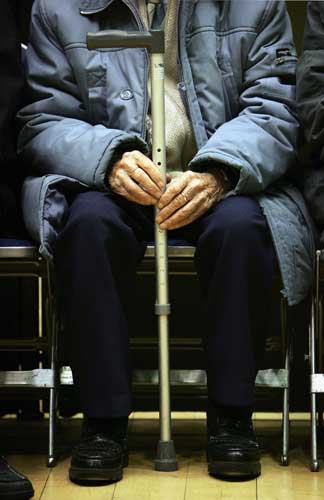Better care for elderly 'could save 60,000 lives'

Elderly people are dying of neglect and spending their final years in pain and discomfort because basic care is not being provided, a study has found.
There are at least 60,000 avoidable deaths in England every year and the study by doctors at the University of East Anglia suggests this figure could be substantially reduced with better care.
Nicholas Steel, a lecturer in primary care who led the study, said 65 per cent of patients in the study who were diagnosed with coronary heart disease were receiving the recommended drug treatment with beta blockers. If this were increased to 90 per cent, estimates suggest it would prevent 3,000 heart attacks and strokes, he said.
"That is one quality indicator and we looked at 32 indicators in all. A 90 per cent target for drug treatment is a realistic target," Dr Steel said.
Charities for the elderly condemned the findings, published yesterday in the British Medical Journal, and said they provided evidence that age discrimination was a significant problem.
The research team investigated the care delivered for 13 different conditions, including heart disease, diabetes, stroke, depression and osteoarthritis. Using questionnaires and face-to- face interviews, and covering both NHS and private care, they found wide variations in whether people received the right test, appropriate drug or proper care.
Treatment for heart disease was rated well, with 83 per cent of the appropriate care delivered. But for osteoarthritis the figure was just 29 per cent.
Dr Steel said: "A lot of the indicators were about quality of life rather than saving lives. The quality of care was poorest in conditions associated with disability and frailty, such as arthritis, incontinence, cataracts, hearing problems and osteoporosis. They are conditions in which an improvement in care can make a big difference."
The independent study of 8,688 people aged over 50 in England found that over all 13 conditions, 62 per cent of the care recommended for older adults was actually received. In geriatric conditions, barely half (57 per cent) was provided.
The authors note that conditions targeted with extra payments in the GPs' contract, introduced in 2004, were dealt with better. In 75 per cent of conditions that attracted payments, people got the right treatment, compared with 58 per cent who received the correct treatment where their condition was not covered by the contract. Geriatric conditions were not included in the contract.
Gordon Lishman, director general of Age Concern, said: "These figures show that age discrimination within the NHS is still rife."
Join our commenting forum
Join thought-provoking conversations, follow other Independent readers and see their replies
Comments
Bookmark popover
Removed from bookmarks